五年级下册英语 (2)
鲁科版英语五年级下册Unit 2 Good Behaviour Unit 2-Lesson3
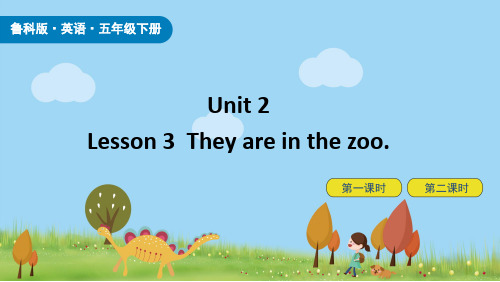
“Ha-ha. I'm your dear, but I’m not a deer,” “哈哈。我是你亲爱的,但我不是一只鹿。” says Li Mei. 李梅说。 They all laugh. 他们都笑了。
Practice
单项选择。 ( A) 1. Sam gives the deer______.
A. some grass B. a grass C. grasses
单项选择。 ( B) 2. There ______ five deer in the zoo.
A. is B. are C. have
grass 草 (不可数名词)
give 给予
I give them two gifts. I give two gifts to them.
My mum is my dear.
dear 亲爱的人
There are many deer in the zoo.
deer 鹿 (单复数同形)
Let’s read
They go to see the deer. 他们去看鹿。 Li Mei gives them some grass. 李梅给它们一些草。 Her aunt says, "Don't feed them too much, my dear.” 她的阿姨说,“亲爱的,不要给它们吃太多。”
根据课文内容填空。
Hello, I’m a deer. I live in the zoo, too. 你好,我是一只鹿。我也住在动物园里。 You can feed me. 你可以喂我。 But please don’t feed me too much. 但请不要喂我太多。 Don’t walk on the grass, please. It’s my food. 请不要在草地上走。那是我的食物。
人教版五下unit2partA
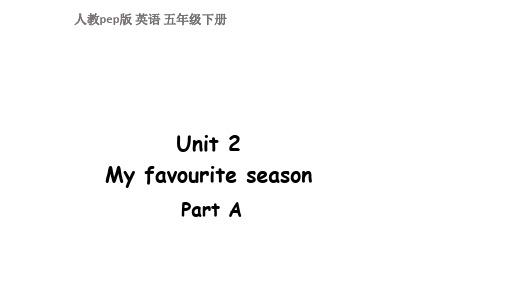
Summary
1. 学习了下列单词: 2. spring, summer, autumn, winter, season, 3. which, best, snow. 4. 2. 学习了下列句型:
伴你成长 5. (1)问答对方是否喜欢某物的句型:
6. — 助动词+人+like+某物 7. — Yes. /No.
Mr Jones: The Four Seasons. Today we'll draw the seasons. Which season do you like best, Mike
Mike: Winter. I like snow. Mr Jones: I like snow, too.
Which season do you like best, Wu Binbin Wu Binbin: Spring. It's pretty. Mr Jones: Yes, it is.
Yes.
Do you like summer
No.
Do you like autumn
Yes.
Do you like winter
Yes.
知识点2 问答最喜欢哪个季节的句型
【教材原文】— Which season do you like best, Mike — Winter.
句式结构 — Which season+助动词+人+like best
Summer.
Which season do you like best
Autumn.
Which season do you like best
Winter.
Which season do you like best ___S_p_r_in_g__. I can fly kites every day. __S_u_m__m_e_r_. I can go swimming every day. ___A_u_tu_m_n__. I can pick apples every day. __W __i_nt_e_r__. I can make snowmen every day.
五年级下册英语第二课汉语
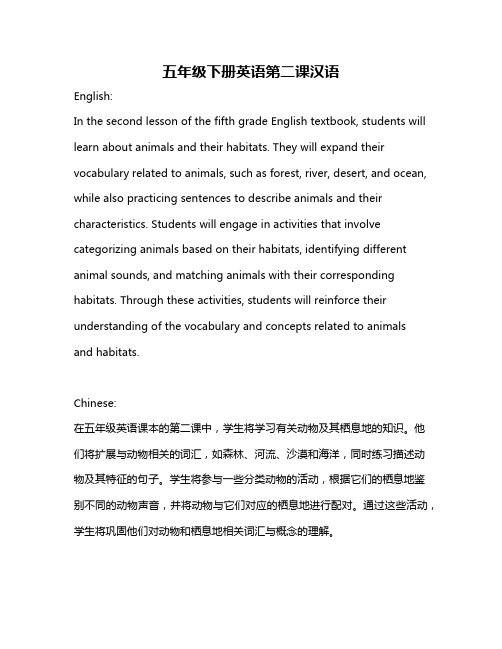
五年级下册英语第二课汉语English:In the second lesson of the fifth grade English textbook, students will learn about animals and their habitats. They will expand their vocabulary related to animals, such as forest, river, desert, and ocean, while also practicing sentences to describe animals and their characteristics. Students will engage in activities that involve categorizing animals based on their habitats, identifying different animal sounds, and matching animals with their corresponding habitats. Through these activities, students will reinforce their understanding of the vocabulary and concepts related to animalsand habitats.Chinese:在五年级英语课本的第二课中,学生将学习有关动物及其栖息地的知识。
他们将扩展与动物相关的词汇,如森林、河流、沙漠和海洋,同时练习描述动物及其特征的句子。
学生将参与一些分类动物的活动,根据它们的栖息地鉴别不同的动物声音,并将动物与它们对应的栖息地进行配对。
通过这些活动,学生将巩固他们对动物和栖息地相关词汇与概念的理解。
五年级下册第二单元英语单词

五年级下册第二单元英语单词五年级下册第二单元英语单词一、动物类1. tiger(老虎)The tiger is a magnificent creature with its distinctive orange and black stripes. It is known for its strength and agility, making it one of the most fearsome predators in the animal kingdom.2. giraffe(长颈鹿)The giraffe is the tallest land animal, with its long neck and legs. It gracefully moves through the African savannah, reaching for leaves on tall trees. Its unique appearance makes it a favorite for many children.3. elephant(大象)Elephants are known for their incredible size and intelligence. They have a long trunk used for various purposes, such as grabbing food and spraying water. In many cultures, elephants are considered symbols of strength and wisdom.4. panda(熊猫)The panda is a beloved creature, known for its black and white fur. It is native to China and has become an international symbol of conservation. Pandas mainly eat bamboo and are known for their cuddly appearance.5. whale(鲸鱼)Whales are the largest animals on Earth. They live in the oceans and have a streamlined body designed for swimming. These majestic creatures are known for their haunting songs and migratory patterns.二、身体部位1. head(头)The head is the part of the body that houses many important organs, such as the brain and eyes. It is also where our senses, such as hearing and smell, are located. Taking care of our head is crucial for our overall well-being.2. arm(手臂)Arms are essential for our daily activities, such as eating, writing, and hugging. They consist of the upper arm, forearm, and hand, which allow us to perform a wide range of tasks. We should exercise and keep our arms strong and healthy.3. leg(腿)Legs provide support and mobility. They allow us to walk, run, and jump. Each leg consists of the thigh, lower leg, and foot. It is important to exercise our legs regularly to maintain strength and flexibility.4. ear(耳朵)Ears are essential for our sense of hearing. They enable us to hear soundsand communicate with others. We should protect our ears from loud noises and clean them regularly to maintain good ear health.5. mouth(嘴巴)The mouth is not only for eating but also for speaking and expressing ourselves. It contains teeth and a tongue, which help in chewing and tasting food. Good oral hygiene is crucial for overall health.三、自然物体1. flower(花朵)Flowers are beautiful, colorful plants that attract bees and butterflies. They come in various shapes and sizes and are often used for decoration and expressing emotions, such as love and friendship.2. tree(树木)Trees are essential for our planet. They provide oxygen, shade, and habitats for animals. Trees come in different types, such as evergreen and deciduous. We should protect and plant more trees to preserve the environment.3. river(河流)Rivers are bodies of water that flow through the land. They are vital for ecosystems and human activities, such as transportation and irrigation. Many cities have developed along rivers, showing the significance of these natural resources.4. mountain(山)Mountains are majestic landforms that reach high into the sky. They provide breathtaking views and are popular destinations for hiking and climbing. Mountains also act as barriers, affecting weather patterns and forming unique ecosystems.5. moon(月亮)The moon is Earth's only natural satellite. It has fascinated humans for centuries, and its changing phases have inspired myths and legends. Observing the moon can be a magical experience and a reminder of the vastness of the universe.以上是五年级下册第二单元英语单词的介绍。
五年级下册人教版英语第2单元课文读法

五年级下册人教版英语第2单元课文读法一、引言在学习英语的过程中,课文的朗读是非常重要的一环。
通过朗读课文,学生可以提高自己的语音、语调、语速等技能,并且可以更好地理解课文内容。
本文将为大家介绍五年级下册人教版英语第2单元课文的读法。
二、课文内容本单元的课文主要讲述了关于学校活动和学生喜好的内容。
通过学习本课文,学生可以学会用英语描述自己喜欢的活动,以及询问别人的喜好。
课文内容主要包括以下部分:1.介绍学校活动,如游泳、跑步、跳迪斯科舞等;2.描述学生喜好的活动,如Tom likes swimming, Mary likes dancing等;3.询问别人的喜好,如What do you like? I like playing football等。
三、课文的基本读法针对不同级别的学生,老师可以采用不同的读法来进行教学。
以下是针对五年级学生的课文基本读法:1. 整体朗读老师可以带领学生进行整体朗读。
老师可以给学生们播放录音,让他们跟读课文内容。
在跟读过程中,老师可以重点关注学生的发音、语调和语速。
通过整体朗读,学生可以熟悉课文内容,提高语感。
2. 分段朗读老师可以让学生分段朗读课文。
可以让学生分角色进行朗读,模拟对话的场景。
在分段朗读的过程中,老师可以纠正学生的发音错误,给予他们适当的指导和帮助。
3. 个别朗读老师可以让学生进行个别朗读。
在个别朗读中,老师可以更加针对性地帮助学生克服发音、语调等问题。
通过个别朗读,学生可以得到更加细致的指导和训练。
四、课文读法的注意事项在进行课文的朗读教学时,老师需要注意以下几点:1. 重视基本语音在进行朗读训练时,老师需要着重训练学生的基本语音。
对于一些困难发音的单词,老师可以设置专门的训练环节,帮助学生克服困难。
2. 注重语调、语速除了语音外,老师还需要关注学生的语调和语速。
通过模仿录音、角色扮演等方式,帮助学生理解正确的语调和语速,并帮助他们进行调整和改正。
冀教版五年级下册 Unit 2知识汇总
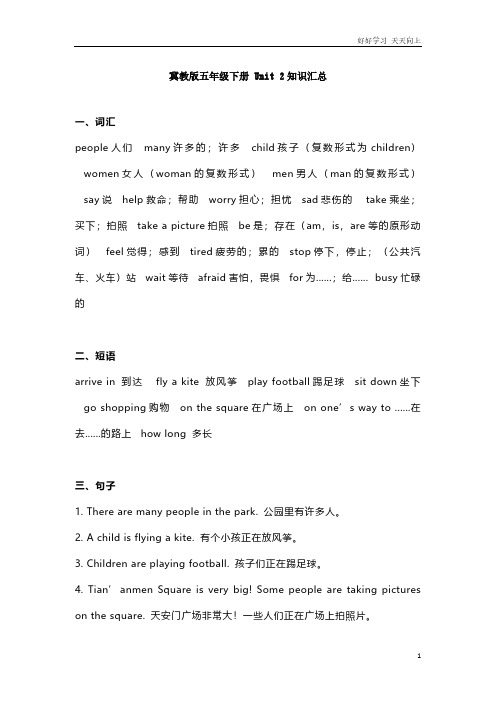
冀教版五年级下册 Unit 2知识汇总一、词汇people人们 many许多的;许多 child孩子(复数形式为children) women女人(woman的复数形式) men男人(man的复数形式) say说 help救命;帮助 worry担心;担忧 sad悲伤的 take乘坐;买下;拍照 take a picture拍照 be是;存在(am,is,are等的原形动词) feel觉得;感到 tired疲劳的;累的 stop停下,停止;(公共汽车、火车)站 wait等待 afraid害怕,畏惧 for为......;给...... busy忙碌的二、短语arrive in 到达 fly a kite 放风筝 play football踢足球 sit down坐下 go shopping购物 on the square在广场上 on one’s way to ......在去......的路上 how long 多长三、句子1. There are many people in the park. 公园里有许多人。
2. A child is flying a kite. 有个小孩正在放风筝。
3. Children are playing football. 孩子们正在踢足球。
4. Tian’anmen Square is very big! Some people are taking pictures on the square. 天安门广场非常大!一些人们正在广场上拍照片。
5. It’s sunny today. The sky is blue. 今天是晴天。
天空很蓝。
6. — How old is the Palace Museum? 故宫多少年历史了?— It’s about six hundred years old. 大约六百年的历史了。
7. On the way back to the hotel, Danny feels tired and hungry. 在回酒店的路上,丹尼感到又累又饿。
冀教版小学五年级英语下册 Lesson 2
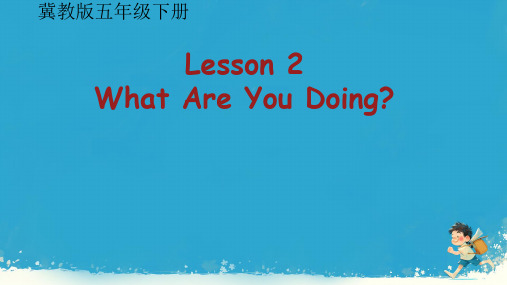
Read part 2. Watch and answer.
What are they doing now?
1.Jenny, what are you doing now? I am drawing a picture.
2. Li Ming, what are you doing now? I am reding a book.
Danny is having breakfast.
have- having
have breakfast
现在进行时的含义
1.表示现在正在进行的动作。 2.表示现阶段正在进行或从事的动作。
现在进行时的构成:be + v.ing,表示主语 正在做某事。 ①Be动词取决于前面的主语。单数is,复数 are;我(I)用am,你(you)用are,is连着他 (he)她(she)它(it)。 ②注意:不是所有动词都能用现在进行时态的, 如:see、like、want、know 等动词往往都 不用进行时态
现在进行时的使用场合:
①某个时间点正在发生的事情,常见的标 志性词有,look、listen、now和at the moment。 ②句子所要表达的意义是在这一阶段正在 发生的事。 ③注意暗含现在进行时。
1
5
What’s Jenny
doing?
2
6
3
She is singing a
7
song.
3.背诵课 文.
Presentation How about Danny?
Danny is not looking out of the window.
What is Danny looking at on the train?
英语五年级下册第二单元单词

英语五年级下册第二单元单词Unit 2 My favourite season (第二单元我最喜欢的季节)一、Words in each unit(单元词汇表)1. spring [ sprin ] 春天2. summer [ 'sama(r) ] 夏天3. autumn [ 'b:tom ] 秋天4. winter [ 'wnto(r) ] 冬天5. season [ 'si:zn ] 季节6. picnic [ pikntk ] 野餐7. go on a picnic 去野餐8. pick [ prk ] 摘;采集9. pick apples 摘苹果10. snowman [ 'snaumaen ] 雪人11. make a snowman 堆雪人12. go swimming 去游泳13. which [ wItf ] 哪一个14. best [ best ] 最;最高程度地15. snow [ snau ] 雪16. good job 做得好17. because [ br'koz ] 因为18. vacation [ vo'keifn ] 假期19. all [ o:l ] 全;完全20. pink [ pink ] 粉色;粉色的21. lovely [ IAvli ] 可爱的;美丽的22. leaf [ li:f ] 叶子(复數leaves [ li:vz ] )23. fall [ fs: ] 落下;[ 美] 秋天24. paint [ pemnt ] 用颜料绘画二、Useful expressions(常用表达法)Which season do you like best ,Miss White?(怀特小姐,你最喜欢哪个季节? )Summer.(夏天。
)Why?(为什么?)Because I like summer vacation!(因为我喜欢暑假!)。
五年级下册第二单元英语

五年级下册第二单元英语
五年级下册第二单元英语主要包括以下几个部分内容:
1.词汇:学习新单词和短语,例如:watch TV(看电视)、read a book(读书)、ride a bike(骑自行车)、play chess(下棋)等。
2.句型:学习一些常用的句型,例如:What do you usually do on weekends?(你周末通常做什么?)、I often watch TV.(我经常看电视。
)、Do you like reading?(你喜欢读书吗?)等。
3.对话:学习日常生活中常用的对话,例如:A:What do you usually do on weekends?B:I often play football. A:Do you like playing football?B:Yes,I do.(A:你周末通常做什么?B:我经常踢足球。
A:你喜欢踢足球吗?B:是的,我喜欢。
)
4.阅读理解:通过阅读短文,理解文章的大意,回答问题等。
5.语法:学习一些基本的语法知识,例如:动词的时态、一般现在时的构成等。
通过以上内容的学习,五年级学生可以提高他们的英语听、
说、读、写的能力,扩大他们的词汇量,培养他们的阅读理解能力和表达能力。
五年级下册英语PEP版-unit2

Unit 2 A Let’s talk(1)【学习目标】1.知识目标:★winter, which, best, snow, season2.能力目标:能正确运用Which season do you like best? I like … best.句型进行交际。
2) Why does Wu Binbin like winter best? ________________________4.说一说:Which season does Mr Jones like best?【当堂练习】今日核心句型:(汉译英)1)你最喜欢哪个季节?2)冬天。
_________________________________________________________ 【拓展提升】1.模仿P14 Let's talk,根据实际,完成对话。
A: Do you like the Four Seasons?B: ____________________________________________________. A: Which season do you like best?B: __________________. __________________________________.2. 试一试,以上面对话为主题和partner编对话吧!【Reading for fun快乐阅读】Unit 2 A Let’s learn(2)【学习目标】1.知识目标:★spring, ★summer, ★autumn,★winter(带★为四会单词或短语)2.能力目标:能运用句型:Which season do you like best? Winter.进行交际。
My Notes 【基础感知】1.打开课本P15,尝试朗读Let’s learn,连线。
①spring ②summer ③autumn ④winter2.阅读P15图文,回答问题:1) Who are they? _________________________________________2) What are they talking about? _____________________________【要点探讨】1.听P15 Let’s learn 对话,回答问题:Which season does Oliver like best?______________________________________________________2.分享会:你是怎样记住新单词的?【当堂练习】1.补全单词,写出中文意思。
(完整版)人教版五年级英语下册unit2_知识点归纳
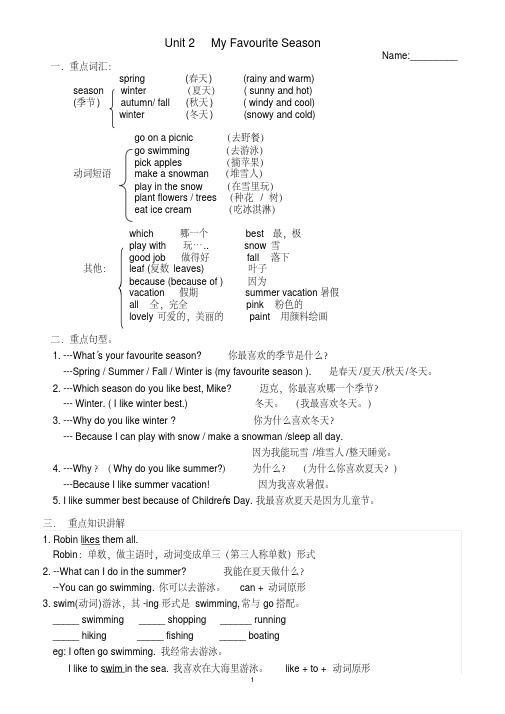
Unit 2 My Favourite SeasonName:_________ 一.重点词汇:spring (春天) (rainy and warm)season winter (夏天)( sunny and hot)(季节) autumn/ fall (秋天) ( windy and cool)winter (冬天) (snowy and cold)go on a picnic (去野餐)go swimming (去游泳)pick apples (摘苹果)动词短语make a snowman (堆雪人)play in the snow (在雪里玩)plant flowers / trees (种花/ 树)eat ice cream (吃冰淇淋)which 哪一个best 最,极play with 玩….. snow 雪good job 做得好fall 落下其他:leaf (复数leaves) 叶子because (because of ) 因为vacation 假期summer vacation 暑假all 全,完全pink 粉色的lovely可爱的,美丽的paint 用颜料绘画二.重点句型。
1. ---What’s your favourite season? 你最喜欢的季节是什么?---Spring / Summer / Fall / Winter is (my favourite season ). 是春天/夏天/秋天/冬天。
2. ---Which season do you like best, Mike? 迈克,你最喜欢哪一个季节?--- Winter. ( I like winter best.) 冬天。
(我最喜欢冬天。
)3. ---Why do you like winter ? 你为什么喜欢冬天?--- Because I can play with snow / make a snowman /sleep all day.因为我能玩雪/堆雪人/整天睡觉。
英语五年级下册第二课翻译,科普版
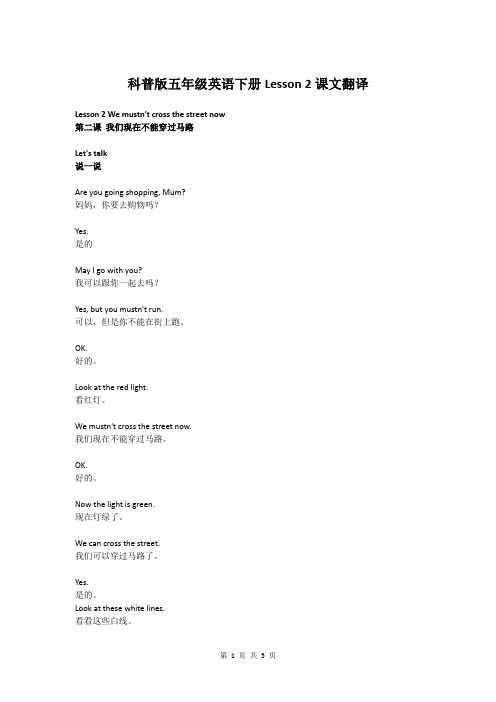
科普版五年级英语下册Lesson 2课文翻译Lesson 2 We mustn't cross the street now第二课我们现在不能穿过马路Let's talk说一说Are you going shopping, Mum?妈妈,你要去购物吗?Yes.是的May I go with you?我可以跟你一起去吗?Yes, but you mustn't run.可以,但是你不能在街上跑。
OK.好的。
Look at the red light.看红灯。
We mustn't cross the street now.我们现在不能穿过马路。
OK.好的。
Now the light is green.现在灯绿了。
We can cross the street.我们可以穿过马路了。
Yes.是的。
Look at these white lines.看看这些白线。
We must cross the street here.我们必须从这里过马路。
Oh, I see.哦,我明白了。
Let's learn学一学You mustn't cross the street here. 你不能从这里穿过马路。
You can cross the street there.你可以从那里过马路。
OK.好的。
turn left向左转park the car停车turn around转身Let's chant说说唱唱Look to the left.看左边。
Look to the right.看右边。
There is a car in sight.那儿有一辆车。
So we do what's right.所以我们做正确的事情。
There's none on the left.左边没有车。
There's none on the right.右边没有车。
pep(人教)五年级英语下册Unit2 A Lets talk 优质课件
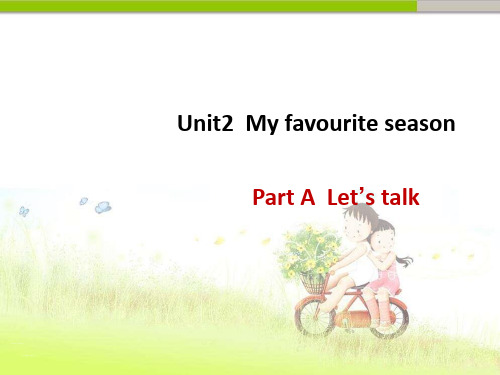
绿色圃中小学教育网 绿色圃中小学教育网
I like winter best.
Which season do you like best?
绿色圃中小学教育网 绿色圃中小学教育网
I like summer best.
Which season do you like best?
I like spring best.
3.认真背诵课文和单词。
• 15、一年之计,莫如树谷;十年之计,莫如树木;终身之计,莫如树人。2021年7月2021/7/202021/7/202021/7/207/20/2021
• 16、提出一个问题往往比解决一个更重要。因为解决问题也许仅是一个数学上或实验上的技能而已,而提出新的问题,却需要有创造性的想像力,而且标志着科学的真正进步。2021/7/202021/7/20July 20, 2021
13、He who seize the right moment, is the right man.谁把握机遇,谁就心想事成。2021/7/202021/7/202021/7/202021/7/207/20/2021
• 14、谁要是自己还没有发展培养和教育好,他就不能发展培养和教育别人。2021年7月20日星期二2021/7/202021/7/202021/7/20
Which season do you like best?
I like autumn best.
•
9、要学生做的事,教职员躬亲共做; 要学生 学的知 识,教 职员躬 亲共学 ;要学 生守的 规则, 教职员 躬亲共 守。20 21/7/2 02021/ 7/20Tue sday, July 20, 2021
• 10、阅读一切好书如同和过去最杰出的人谈话。2021/7/202021/7/202021/7/207/20/2021 2:25:09 AM
五年级下册英语单词第二单元

五年级下册英语单词第二单元第二单元单词列表:1. angry 生气的2. bored 感到无聊的3. brave 勇敢的4. bright 明亮的5. calm 镇静的6. careful 小心的7. cheerful 快乐的8. clean 干净的9. clear 清晰的10. clever 聪明的在五年级下册英语中学习这些单词,是为了拓展孩子们的语言能力和认知范围。
这些词汇都是基本的形容词,它们能够帮助孩子们更好地描述和表达自己和周围事物的状态。
首先是生气的,这是一种非常常见的情绪。
当我们遇到一些不顺心的事情或者别人做了一些让我们不满意的事情时,我们就会感到生气。
在这种时候,我们可能会脾气爆发,有些人甚至会用语言或行为来发泄情绪。
所以,我们要学会控制自己的情绪,不要让生气控制我们。
其次是感到无聊的。
无聊是一种与生活质量和创造力有关的情感状态。
当我们感到无聊时,就说明我们对周围的环境或事情感到失去兴趣,缺少动力去尝试新鲜事物。
这时候我们可以通过看书、听音乐、和朋友交流等方式来克服无聊。
勇敢是另外一个重要的词汇,它代表了一种愿意冒险和面对挑战的精神。
勇敢的人通常具有积极的态度,有勇气去面对困难和不确定性。
他们不轻易放弃,善于寻找解决问题的方法。
明亮是指光线充足、清晰,没有阴影的状态。
明亮的环境会使人感到舒适和愉悦,而暗淡的环境则会让人感到沮丧和心情低落。
所以,我们要注意保持光线充足的环境,这有助于提高我们的工作和学习效率。
镇静是指一种放松的状态,没有过大的情绪波动和压力。
很多时候,我们会遇到一些烦恼和压力,这时候保持镇静非常重要。
我们可以通过深呼吸、放松肌肉等方式,让自己恢复镇静和平静。
小心是指一种慎重的态度,能够注意到周围的细节和可能存在的危险。
小心的人通常会在做任何事情之前先思考,尽可能减少错误和风险。
快乐是指一种积极、阳光、开心的情绪。
快乐的人通常是对生活充满热情和希望的,他们喜欢与人交流,享受生活的美好。
湘少版五年级下册英语 第二课翻译

湘少版五年级下册英语第二课翻译Mike's summer camp迈克的夏令营Mike is at summer camp.迈克在夏令营What will he do?他要做什么?Listen and match.听并匹配。
Dialogue 1Hi,mum.你好,妈妈。
Hi,how was your summer camp?你好,你夏令营怎么样?Fine.Today,we are having our class.很好。
今天我们要上课。
Good.好。
On August 1st,we'll have a sports day.八月一日,我们有运动日。
Dialogue 2What are you doing now?你现在在做什么?We're listening to music.We'll have lunch.我们在听音乐。
我们要吃午饭了。
I see.What's for lunch?我知道了。
午饭吃什么?Milk and eggs.牛奶和鸡蛋。
Dialogue 3What else will you do at camp?你在夏令营还要做什么?On the 6th,we'll have a trip to the forest.六号,我们要去森林旅行。
That's sounds fun.听起来不错。
And on the 11th,we'll have a party.十一日,我们要举办一个派对。
Great.太棒了。
Dialogue 4OK.Mike.Be a good boy.Keep your room clean.好。
迈克。
做一个好男孩。
保持房间干净。
I will.我会的。
See you at home on August 12th.八月十二日家里见。
OK.Byebye,I love you,mum好。
拜拜,我爱你,妈妈。
Love you,too.也爱你。
【中文注释】五年级下册英语课文lesson 2

【中文注释】五年级下册英语课文lesson 2
现在小学英语的教学,并不给学生教授单词的音标,也不针翻译单词的具体意思,只是让学生知道课文中语句、对话的大概意思。
这样的结果是,孩子们可能看着课文会读,离开课本就基本上什么都不知道了。
因此,将课本(北京出版社)中的语句按照单词、语句每个都翻译,让孩子在朗读的时候就知道每个单词、每个句子的准确意思,明明白白地学习,十分有意义。
这样,笔者将英语课文进行了逐词、逐句的翻译,供有需要的家长和孩子们使用。
祝你们在英语学习上能更进步。
Lesson 2。
五年级下册英语书第二单元单词

以下是五年级下册英语书第二单元的一些常见单词和短语,以供参考:1.Monday 星期一2.Tuesday 星期二3.Wednesday 星期三4.Thursday 星期四5.Friday 星期五6.Saturday 星期六7.Sunday 星期天8.weekend 周末9.wash 洗10.wash my clothes 洗我的衣服11.watch 观看;看电视12.do 做;干13.do homework 做作业14.read 读;阅读15.read books 读书16.play 玩;踢17.play football 踢足球18.cooking 烹饪;烹调19.often 经常;常常20.park 公园21.tired 疲倦的22.sport 运动23.every 每个;每一个24.day 一天;日子25.schedule 安排26.lesson 课;课程27.then 然后;接着28.next 下一个的;紧接着的29.week 周;星期30.morning 早上;上午31.afternoon 下午;午后32.evening 晚上;傍晚33.night 夜晚;夜间34.together 一起;共同35.homework 作业36.class 课;班级37.music 音乐38.math 数学39.Chinese 语文;中文40.art 美术41.PE 体育42.science 科学43.start 开始ually 通常;常常45.time 时间46.at 在(某个时间点或地点)请注意,不同版本的教材可能单词列表有所不同,以上只是常见的单词和短语。
为了获得最准确的单词列表,建议直接参考你所使用的教材。
小学英语五年级下册Unit2单元教材及学情分析(人民版)

小学英语五年级下册Unit2单元教材及学情分析(人民版)教材内容概述这个单元主要是介绍有关购物的英语词汇和表达方式。
教材内容涵盖以下几个方面:1. 词汇部分:学生将研究与购物相关的基本词汇,如货币单位、购物场所、食物、服装等。
他们将研究如何问价格、购买数量以及表达购物需求。
2. 句型部分:学生将研究购物场景中常用的句型,如“How much is it?”、“Can I help you?”等。
通过这些句型的研究,他们将能够更好地与他人进行购物对话。
3. 阅读和听力:学生将通过阅读和听力练来巩固所学的词汇和句型。
他们将阅读有关购物场景的短文,并回答相关问题。
此外,他们还将聆听购物对话和问答,并根据所听内容选择正确的答案。
学情分析通过对这个单元的学情分析,我们可以得出以下一些观察和结论:1. 学生对购物相关的英语词汇较为熟悉,能够较准确地表达购物需求和询问价格。
2. 学生对购物场景中常用的句型理解较好,能够积极参与购物对话,提出问题和回答问题。
3. 学生在阅读和听力方面还存在一些挑战。
部分学生在听取购物对话和问答时,对所听内容理解不够准确,容易选择错误的答案。
基于以上观察和结论,我们可以采取以下措施来帮助学生提高听力和阅读能力:1. 增加听力练的频率,让学生经常接触购物对话和问答,并通过听力练来提高对所听内容的理解。
2. 鼓励学生多读相关的英语购物材料,如商场广告、折扣活动宣传等,来提高阅读能力和对购物场景的理解。
3. 提供更多的练题和活动,让学生在购物场景中进行角色扮演,加强他们对所学知识的应用能力。
通过以上措施的实施,我们相信学生们的听力和阅读能力将有所提高,他们将能更好地应对购物场景中的英语交流需求。
- 1、下载文档前请自行甄别文档内容的完整性,平台不提供额外的编辑、内容补充、找答案等附加服务。
- 2、"仅部分预览"的文档,不可在线预览部分如存在完整性等问题,可反馈申请退款(可完整预览的文档不适用该条件!)。
- 3、如文档侵犯您的权益,请联系客服反馈,我们会尽快为您处理(人工客服工作时间:9:00-18:30)。
Module 1Unit1 She was a driver before.Preparation (预习)一.听读课文(3遍)。
二.翻译课文。
三.在字典里查阅下列单词,写出音标以及词性。
1. player2. driver3. drove四.写出5个家庭成员的英语单词。
例:祖母grandma1. _____________2.3 4. _______________ 5. _______________五.按要求写出下列单词。
1、play(过去式)___________2、he(形容词性物主代词)___________3、could(原型)____________4、now(反义词)____________5、driver(动词)__________6、is(过去式)______________Review (复习)一.根据课文填空。
1、She______ ___ _________ __________.(以前是司机)。
2、________ __________(什么音乐)did he play?3、She was young _____ ______ _________. (在这张照片里)。
4、_______ _______ she _________( 驾驶什么)?5、I can_______ _____ ________ _______,________.(也吹笛子)二.选择合适的一项。
( )1、What music _____he play? He played Chinese music.A、didB、doC、doesD、didn't( )2、Can she play the drums? No,______.A、he canB、she can'tC、I can'tD、he can't( )3、Who's this? _____my grandpa.A、She'sB、HisC、He'sD、It's( )4、This is my grandma. She___ young in this picture.A、wasB、isC、wereD、are( )5、What does he ___? He____ PE.A、learn,learnB、learn,learnsC、learn,learnesD、learns,learns 三.根据要求改写句子。
1. She drove a bus. (划线提问)____________________________________________________ 2. He played Chinese music.(根据答语写问句)____________________________________________________ 3.It’s my grandpa. (对划线部分提问)____________________________________________________Unit2 He worked in an office. Preparation (预习)一.听读课文(3遍)。
二.翻译课文。
三.写出下列单词的中文意思。
四.查阅资料了解更多的公共场所。
例:hospital 医院1. 2.3. 4.5. ____________6.Review (复习)一. 写出下列词语的单三形式和过去式。
例:do- does- did1. work- ______- _______2.study-________-_______3. drive-______-________4.play -_______- _______二.根据课文情景补充完对话A:__________did your grandpa work?B:_____ ________in _____office.A:Where did your grandma________?B:______worked ____ a factory.A:Where ______ your parents(父母)work?B:My mother works _____ ____ shop.My father _______ in a hospital.三.写出下列句子或短语的完整形式,没有完整形式的请打“×”。
例:We’re in the office.We are in the office.1. He’s got a fish. ____________________.2. He’s got a train. ____________________.3. Who’s this? ____________________4. You can’t. _____________________.5. Lingling’s father is a doctor._____________________Summary (语法与知识点小结)1、一般过去时的特殊疑问句构成=特殊疑问词+一般过去时的一般疑问句did+主语+动词原形)2、before和now 的区别:before是以前的意思,一一般过去时的标志;now的词义是现在,是一般现在时或现在进行时的标志。
3、was 和were的区别:was是is 的过去式,were是are的过去式。
4、There be 句型的过去式:There were/There was .5、一般过去时和一般现在时的区别:一般过去时用来描述过去发生的事,而一般现在时是指现在经常或习惯性发生的动作或状态,一般过去时中动词要用过去式,而一般现在时中如果主语是单三人称,动词也要用单三形式。
6.询问职业或工作地点Where does he/she work?Where do you/they work?7.表示在某一场所内常用表达in a/an office/ hospital/ school...Exercise:用选择适当的词语填空。
1、What_______(was/ is/were) her mother before? She was a nurse.2、His father_______(drive/drives/drove) a train before.3、What _____(do/does/did) she teach? She teaches English.4、What_____(is/be/was) he now? He's a driver.5、He______ (/played/plays/play) the flute before.6、What______(is/are/were) you doing now?I_____(/is/am/was) reading a book.7、They______(are/did/were) in England for 2 years.Module 2Unit1 What did she have for lunch? Preparation (预习)一.听读课文(3遍)。
二.翻译课文。
三.在课本里找出下列单词,并查字典写出音标以及词性。
早餐午餐晚餐美味的传统的________________________四.写出5个食品的英文名称。
例:rice米饭_________________ ________________ ____________________ 五.造句。
1.delicious2.traditionalReview (复习)一.根据课文回答问题。
1. Who has got an e-mail from Lingling?________________________________________2.What does the e-mail say?_______________________________________3.What did Lingling have for lunch yesterday?_______________________________________4.Did Lingling have a traditional American dinner?______________________________________二.写出下列短语。
1.一封电子邮件_____________2. 传统英式菜肴____________3.一间办公室 ____________4. 吃午餐 _________________5.鸡蛋和香肠_________________6.鱼和薯片 _____________ 三.将下列名词变复数形式。
1、family----____________2、fish-----_______________3、potato-----___________4、man------_______________5、sausage-----_____________6、sandwich------_______________Unit2 Lunch is usually at half past twelve.Preparation (预习)一.听读课文(3遍)。
二.翻译课文。
三.在字典里查阅下列单词,写出音标以及词性。
specialusuallyat half past...四.翻译下列的句子。
1. In England, school often finishes at 4 o’clock.2. We usually start school at half past 8.3.Daming usually has meat , vegetables and rice for dinner.Review (复习)一.写出下列短语1. 在每个星期五 ____________2. 在六点半________________3.吃早餐 __________________4.一起吃午饭_______________5. 在英国_____________6. 星期天很特别_________________三.选词填空。
what , like , for , had , does , delicious , traditional A:________did you have_______dinner yesterday?B:I_______fish and chips. I________them very much.A:Are they _______English food?B:Yes,they are.A:________your mum like them?B:Yes,she does.She says they are_________.四.根据要求完成句子。
